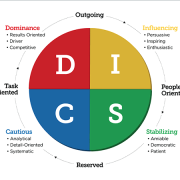DISC Profile – Types and colors
DISC is a personality model that describes human behaviour and communication styles based on four fundamental dimensions:
- Dominance (D)
- Influence (I)
- Steadiness (S)
- Conscientiousness (C)
The model is often used to understand differences between people, strengthen collaboration, and improve communication.
DISC is not a measure of intelligence or professional ability – rather, it is a way of understanding how individuals naturally act, respond, and thrive in different situations. Most people display traits from more than one type, but one or two usually stand out as the most dominant.
Each type is commonly associated with a colour, making them easier to remember and recognise:
- 🔴 D – Red (Action-oriented and driven)
Dynamic, results-focused, direct, and competitive. - 🟡 I – Yellow (Outgoing and enthusiastic)
Sociable, positive, inspiring, motivated by relationships and community. - 🟢 S – Green (Friendly and supportive)
Patient, steady, cooperative, seeking harmony and security. - 🔵 C – Blue (Logical and systematic)
Analytical, precise, quality-conscious, motivated by facts and structure.
How the DISC types complement each other
One of the strengths of the DISC model is that it shows how differences can be a resource. Each type has its strengths and blind spots, but together they can create powerful teams:
- The Red D-type drives progress, challenges the status quo, and ensures that action is taken.
- The Yellow I-type contributes energy, enthusiasm, and the ability to bring people together around an idea.
- The Green S-type provides stability, support, and a safe environment where everyone feels heard.
- The Blue C-type ensures quality, structure, and well-founded decisions.
When all four types are represented, balance emerges: drive is matched with consideration, energy is balanced by stability, and ideas are supported by facts. This is why DISC is often used in teams, where the goal is not only to understand differences but also to use them as strengths.
D – Action-oriented and driven (Dominance)
The D-type is characterised by decisiveness, strength, and a constant pursuit of results. They are naturally competitive and motivated by challenges, change, and the desire to make an impact. For D-types, it is important to maintain control of situations and to move forward at pace. They think in terms of opportunities and solutions and are willing to take risks to achieve their goals.
They may appear impatient with lengthy discussions or details that, in their view, slow down the process. Instead, they prefer to make quick decisions and take action, even if not everything has been fully considered. Their energy and direct style often make them appear as leaders or initiators who get things moving.
A D-type values efficiency and clear goals. They can be very demanding – both of themselves and others – but they see this as a natural part of driving progress. While they may come across as tough, they are often motivated by a strong desire to achieve great results and make a difference.
I – Outgoing and enthusiastic (Influence)
The I-type is open, social, and energetic. They have a natural ability to connect with others and are motivated by relationships, recognition, and a sense of belonging. Their communication style is warm, engaging, and enthusiastic, which makes them effective at inspiring and persuading others.
They thrive in environments filled with activity, interaction, and opportunities to share ideas. For I-types, atmosphere and relationships often matter more than details or rules. They can be spontaneous and impulsive, which makes them flexible but also more likely to quickly move on to the next exciting opportunity.
One of their greatest strengths is their ability to create energy and engagement within a group. Naturally optimistic, they see opportunities even when challenges arise. Their main difficulty can be maintaining focus over longer periods or delving into details, which they often find less appealing.
S – Friendly and supportive (Steadiness)
The S-type is calm, patient, and reliable. They value stability, security, and predictability in their surroundings. For them, harmony and good relationships are more important than being in the spotlight. They have a natural ability to listen, support, and create balance, which often makes them highly valued colleagues and friends.
S-types are known for their loyalty and willingness to help. They go to great lengths to ensure others feel comfortable, and they prefer to avoid conflict. When disagreements arise, they aim for compromise and consensus rather than pushing their own agenda.
They tend to work at a steady pace and may sometimes appear reserved, especially when faced with change or uncertainty. They prefer to know what to expect and feel most at ease in familiar settings. Once trust is established, however, they are highly dedicated and committed – with a strong ability to build long-lasting relationships based on trust and respect.
C – Logical and systematic (Conscientiousness)
The C-type is driven by a strong need for accuracy, quality, and facts. Often perfectionistic, they feel most comfortable when they have access to clear rules, standards, and methods. For them, success is not about being the fastest but about doing things correctly and thoroughly. They may appear reserved or detached, but behind this lies a sharp analytical mind that constantly evaluates how things can be improved or optimised.
C-types have a natural focus on detail and notice errors, inconsistencies, or a lack of logic that others may overlook. This makes them strong problem-solvers, though it can also mean they spend considerable time double-checking to ensure nothing is left to chance. Their strength lies in their thoroughness, though they may feel uncertain or hesitant when clear guidelines are lacking.
They are often more introverted and do not need to be in the spotlight. Instead, they appreciate calm, structured settings where they can focus and work without distraction. They are motivated by delivering high quality and by being able to demonstrate that their conclusions are well-founded.



